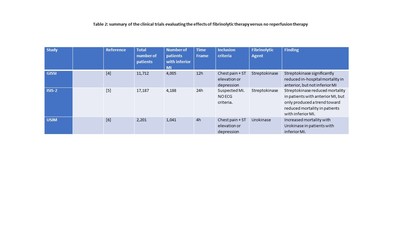Birnbaum, Y; Levine, GN; French, J; Kaski, JC; Atar, D; Alam, M; Hasdai, D; Jneid, H; Uretsky, BF
(2020)
Inferior ST-Elevation Myocardial Infarction Presenting When Urgent Primary Percutaneous Coronary Intervention Is Unavailable: Should We Adhere to Current Guidelines?
Cardiovasc Drugs Ther, 34 (6).
pp. 865-870.
ISSN 1573-7241
https://doi.org/10.1007/s10557-020-07039-0
SGUL Authors: Kaski, Juan Carlos
|
Microsoft Word (.docx)
Accepted Version
Available under License ["licenses_description_publisher" not defined]. Download (97kB) |
||
|
Image (TIFF) (Figure 1)
Accepted Version
Available under License ["licenses_description_publisher" not defined]. Download (2MB) | Preview |
|
![[img]](https://openaccess.sgul.ac.uk/112144/10.hassmallThumbnailVersion/Table%202.jpg)
|
Image (JPEG) (Table 2)
Accepted Version
Available under License ["licenses_description_publisher" not defined]. Download (85kB) | Preview |
Abstract
The pivotal studies that led to the recommendations for emergent reperfusion therapy for ST-elevation myocardial infarction (STEMI) were conducted for the most part over 25 years ago. At that time, contemporary standard treatments including aspirin, statin, and even anticoagulation were not commonly used. The 2013 American College of Cardiology Foundation (ACCF)/American Heart Association (AHA) guidelines and the 2017 European Society of Cardiology guidelines give a class I recommendation (with the level of evidence A) for primary percutaneous coronary intervention (pPCI) in patients with STEMI and ischemic symptoms of less than 12 h. However, if the patient presents to a hospital without pPCI capacity, and it is anticipated that pPCI cannot be performed within 120 min of first medical contact, fibrinolytic therapy is indicated (if there are no contraindications) (class I indication, level of evidence A). Our review of the pertinent literature shows that the current recommendation for inferior STEMI is based on the level of evidence lower than A. We can consider level B even C, supporting the recommendation for fibrinolytic therapy if pPCI is not available for inferior STEMI.
| Item Type: | Article | ||||||||
|---|---|---|---|---|---|---|---|---|---|
| Additional Information: | This is a post-peer-review, pre-copyedit version of an article published in Cardiovascular Drugs and Therapy. The final authenticated version is available online at: http://dx.doi.org/10.1007/s10557-020-07039-0 | ||||||||
| Keywords: | Fibrinolytic therapy, Guidelines, Reperfusion therapy, ST-elevation myocardial infarction, Cardiovascular System & Hematology, 1115 Pharmacology and Pharmaceutical Sciences | ||||||||
| SGUL Research Institute / Research Centre: | Academic Structure > Molecular and Clinical Sciences Research Institute (MCS) | ||||||||
| Journal or Publication Title: | Cardiovasc Drugs Ther | ||||||||
| ISSN: | 1573-7241 | ||||||||
| Language: | eng | ||||||||
| Publisher License: | Publisher's own licence | ||||||||
| PubMed ID: | 32671603 | ||||||||
| Dates: |
|
||||||||
 |
Go to PubMed abstract | ||||||||
| URI: | https://openaccess.sgul.ac.uk/id/eprint/112144 | ||||||||
| Publisher's version: | https://doi.org/10.1007/s10557-020-07039-0 |
Statistics
Actions (login required)
 |
Edit Item |


